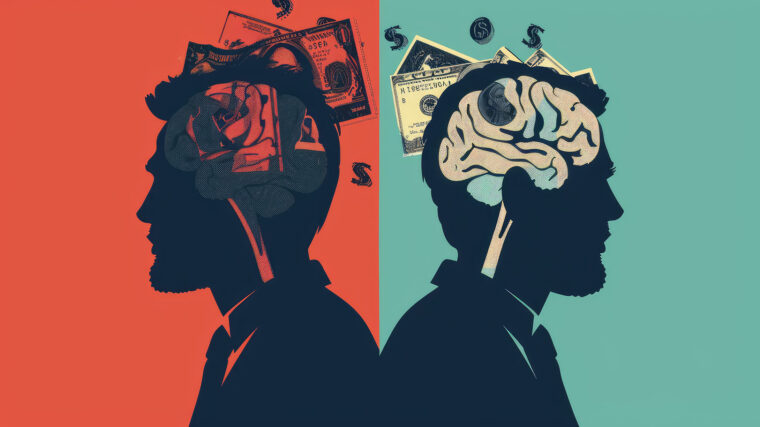Introduction
Money, often seen simply as a means of exchange, actually plays a deep role in shaping human psychology and culture. Beyond just facilitating trade, money impacts how people see themselves, influences relationships, and reinforces cultural norms. Evolving from ancient bartering to today’s digital finance, money has come to embody power, independence, and social status, while also shaping interactions and behavior. This article examines money’s impact on human psychology and culture by drawing from the work of thinkers like Karl Menger, Armen Alchian, Georg Simmel, Geoffrey Ingham, and Bill Maurer. Together, their insights show that money is a powerful cultural force that reaches far beyond its economic utility.
Money’s Influence on Emotional and Psychological Well-being
Money has a significant impact on emotions and mental well-being, often becoming a foundation of security and self-worth. Financial stability can create feelings of peace, while financial struggles frequently lead to anxiety and stress. Simmel, a prominent sociologist, discusses how money generates a sense of emotional detachment. He views money as an abstraction that separates people from the core value of goods, experiences, and even social connections. According to Simmel, this abstraction changes how people connect with each other and with society, leading to less personal engagement and more impersonal transactions (Simmel, 1978).
As more and more transactions are conducted through money, relationships can lose their personal touch, creating a psychological distance that leads to a sense of indifference, or what Simmel calls a “blasé” attitude. This outlook is a kind of psychological adaptation to a world where everything is measured in monetary terms, which in turn leads people to emotionally detach from both the goods they buy and the people they meet. In this sense, money doesn’t just change the way people trade goods; it also affects their sense of connection and psychological fulfillment.
Changing Social Interactions through Economic Efficiency
Money fundamentally altered social interactions, particularly compared to earlier barter systems where exchanges were more personal and direct. In barter economies, people had to negotiate and directly connect with one another to complete exchanges. With money, however, there’s a standardized measure that eliminates the need for these personal negotiations. Economist Armen Alchian highlights that the main economic advantage of money is its ability to streamline exchanges, making transactions faster and more efficient by removing the time and effort required for bartering (Alchian, 1977). Yet, while this efficiency is valuable, it comes at the cost of relational depth. Money allows people to carry out transactions quickly and impersonally, reducing the social bonds that were more common in bartered exchanges. Alchian’s view complements Simmel’s thoughts on detachment, showing that although money makes transactions simpler, it also transforms social interactions, making them more business-like and less personal.
Money as a Tool of Institutional Power and Social Structure
Geoffrey Ingham expands on the idea of money by exploring its role as a fundamental institution that shapes social structures and power dynamics. In modern societies, money is not only a medium for economic transactions but also a tool that enforces social hierarchies. Ingham argues that because governments and financial institutions control money, they determine people’s access to resources, creating and reinforcing social divides (Ingham, 2004). This shows that money is more than just a means of trade; it’s a form of social and institutional power.
Ingham’s insights reveal how money structures society, influencing who gains access to opportunities and privileges. For example, individuals with financial wealth often have better access to high-quality education, healthcare, and influential social networks, while those without wealth face more barriers. Ingham’s ideas complement Alchian’s by showing that while money increases efficiency in transactions, it also creates social hierarchies that can limit upward mobility for those with fewer financial resources.
The Role of Money in Cultural Identity and Values
Anthropologist Bill Maurer brings a cultural angle to the study of money, exploring how it shapes identities and societal values. In many cultures, money is closely linked to self-worth, social status, and respect. This is especially true in capitalist societies, where wealth often represents achievement and social standing. Maurer argues that while money facilitates economic transactions, it also reflects and reinforces the values of a society, influencing how individuals perceive themselves and others (Maurer, 2006).
Across various cultures, money often holds symbolic meanings beyond its economic value. For example, in some communities, certain forms of currency are used exclusively in ceremonial or family exchanges, representing social bonds and kinship rather than purely economic value. This dual purpose of money shows that it is deeply embedded in cultural and social contexts, influencing how people define success and their sense of identity. Maurer’s perspective underlines that money is not just a financial tool but also a reflection of cultural values, shaping both individual self-perception and societal norms.
From Fulfilling Needs to Pursuing Material Desires
The evolution of money as a standardized measure of value has contributed to a cultural shift toward materialism, where financial wealth and possessions are often viewed as markers of success and happiness. Simmel discusses how assigning monetary value to everything encourages a materialistic outlook, leading people to connect their self-worth with their ability to acquire goods and assets. This shift reflects a broader social emphasis on material wealth as a sign of personal and social achievement (Simmel, 1978). Karl Menger’s foundational work on the origins of money offers insights into how this materialistic orientation developed. Menger explains that money was initially embraced for its ability to make trade easier and solve the challenges of barter. Yet, as money became a standard measure of value, people began to associate their financial status with personal happiness and success (Menger, 2000).
This change represents a cultural transformation in which money transitioned from a practical tool to a key source of personal identity and social status, driving a focus on material accumulation. This focus on material wealth has significant psychological implications. In societies where financial success is celebrated, individuals may feel pressure to meet certain standards of living, leading to anxiety and competition. The cultural orientation toward material wealth not only fuels economic activity but also affects mental health and social behavior, creating a cycle in which people strive to accumulate more wealth to feel valued and respected.
The Dual Nature of Control and Independence
Ingham further explores the complex role of money as both a means of independence and a form of control. On one hand, money allows people to make choices and fulfill their needs independently. However, this independence is limited by the social and institutional systems that regulate money and control its accessibility (Ingham, 2004). The concepts of credit and debt illustrate this dual nature. Financial institutions provide credit, which allows people to achieve goals that might otherwise be out of reach, such as buying a home or funding an education. However, debt also brings obligations, binding people to financial institutions and creating long- term dependencies.
This balance shows that while money can provide freedom, it can also make people reliant on the broader systems that control financial access. Thus, money enables independence while also reinforcing social norms and expectations, shaping both personal autonomy and social constraints. Alchian’s view of money’s efficiency aligns with Ingham’s thoughts, as he highlights how money allows for quick, impersonal exchanges. Yet, Alchian notes that this sense of independence can be misleading, as individuals remain bound by the societal rules and regulations governing money. The ease of transactional exchanges can feel liberating, but the systems that define access to money and determine its use underscore the delicate balance between personal freedom and social control.
Contradictions in Modern Views of Money
Bill Maurer’s anthropological insights reveal several contradictions in how people view money in today’s society, where it’s seen both as a personal asset and a societal institution. Money enables people to pursue goals, meet desires, and accomplish personal milestones like buying a home or starting a business. Yet, this empowerment often comes with mental and emotional pressures, as individuals may feel the need to amass wealth to secure self-worth and social acceptance. Maurer shows that money isn’t just a tool for independence; it’s also a source of stress, where pursuing financial success becomes more of a cultural obligation than a personal decision (Maurer, 2006).
This contradiction is further highlighted by cultural differences in how money is valued. In capitalist societies, money is often considered the ultimate symbol of success, while other cultures might view wealth with skepticism or as secondary to social connections. For instance, some societies set aside specific forms of currency for spiritual or community exchanges, suggesting that while money has a universal role in economies, its psychological and cultural significance varies widely. Maurer’s observations show that while money serves similar purposes in economic systems worldwide, its cultural meaning and psychological impact are diverse. For some, money is essential to identity and success, while for others, it remains a practical tool with limited social value. This variety shows that money, while central to human culture, takes on different roles depending on societal values.
Final Thoughts
The psychological and cultural dimensions of money reveal its far-reaching influence beyond simple transactions. Money shapes how people see themselves, relate to each other, and navigate societal expectations. Through the perspectives of Menger, Alchian, Simmel, Ingham, and Maurer, we see that money is a complex institution that affects personal identity, social relationships, and cultural values. As societies continue to evolve and digital financial systems expand, understanding the deeper psychological and cultural roles of money will be essential. Money remains both a source of empowerment and a marker of material success, yet it also defines, constrains, and shapes the values of individuals and communities alike.



